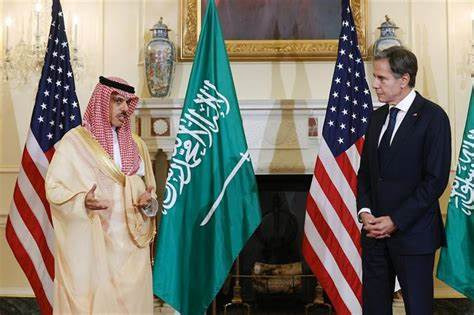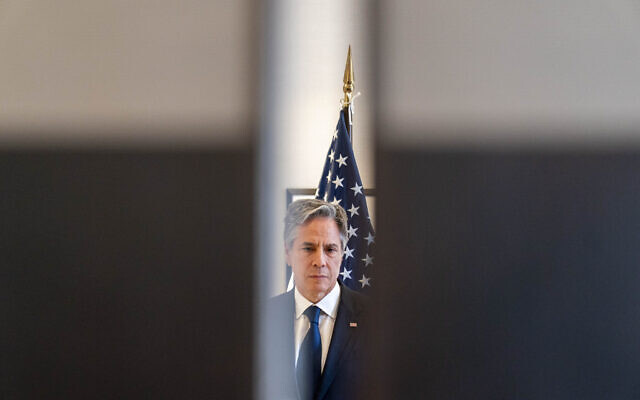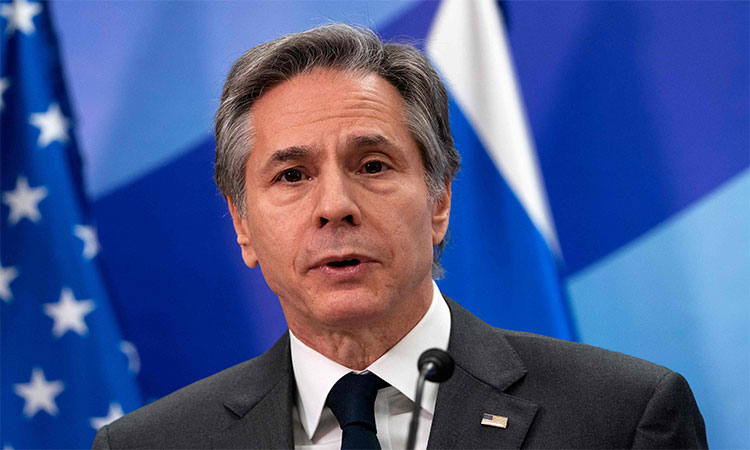Antony Blinken, the US secretary of state, moves to Saudi Arabia on Tuesday, to restore the destabilizing relations between traditional allies – USA and Saudi Arabia. Issues encompassing Iran, regional security, and soaring oil prices are the major points of discussion. Besides, Riyadh’s normalization with Israel, albeit a far-fetched dream, is also going to be included in the meeting.

Figure 1 Image Source: Reuters
Main objectives of Saudi visit
Two issues are going to occupy the major space in the talks: security and economy. A couple of days ago, Saudi Arabia, the largest exporter of oil in the world, cut its crude oil production to dampen the oil prices to benefit its economy. This is the trigger moment for Blinken’s Saudi visit as Riyadh’s move is likely to have a negative impact on the USA.

Figure 2 Image Source: AFP
There are other reasons as well that have strained the relations between Washington and Riyadh over the period of time which this tour is expected to address. China brokered a peace deal between Saudi Arabia and Iran has raised fears of mounting Chinese influence in the Middle East where the US considers its hegemony.
According to Richard Goldberg, a senior adviser at the Foundation for Defense of Democracies, daunting against the blossoming Saudi-Chinese relationship is one of the major goals of the visit. He further says that the USA should make a convincing case before the Saudis that how China’s prolonged relations with Saudi are inconsistent with Saudi interests and how this would dilapidate the bonhomie between older allies, that is, Riyadh and Washington.
In addition, the visit is taking place while Saudi Arabia welcomed Syria back into the Arab League after a decade and was involved in a proxy war against the Syrian regime. The US government has, however, expressed that it is not going to concede the pariah regime and there are bleak prospects that US might lift the sanctions.
Apart from this, there are hopes that the USA might mediate between the Saudis and Israelis for signing a peace treaty. Blinken on Monday spoke at the American Israel Public Affairs Committee(AIPAC), a pro-Israeli lobby group, that the US has “a real national security interest” in pushing for the normalization of relations between Israel and Saudi Arabia but he there was a caveat that it requires time for the relations to shape.
Why did US-Saudi relationship deteriorate?
Saudi Arabia has been US’s closest ally in the Middle East for decades. Their strategic amiability could be summed up as “oil for security” which means that Saudi Arabia fulfilled the oil needs of the USA while ensuring security through weapons and armaments from the USA. But in recent years, the vine of long-term friendship seems to have withered.

Figure 3 Image source: AP
The USA discovered shale oil in its territory in 2014, which reduced the dependence of the USA on Saudi Arabia. After Joe Biden came to power, his policy was that of retreating from the Middle East and unwavering focus on the Indo-Pacific. This jeopardized the military protection of the Middle East.
Even before that, the Iran nuclear deal had complicated the relationship because Saudi Arabia did not consider the deal as effective; instead, it would bring Iran closer to the development of nuclear weapons. Moreover, Biden’s election campaign also showcased its pullback from Saudi Arabia. He asserted that he would treat Saudi Arabia as a pariah.
Thereafter, the murder of Jamal Khashoggi worsened the relationship. The Biden administration had even published an Intelligence report which claimed that the Saudi crown prince, Mohammad Bin Salman had been behind the assassination of the journalist.
Further, China’s involvement in the region has become a cause of concern for USA’s supremacy in the region. With USA’s imports declining from Saudi, China has considerably become one of the largest importer from the Middle East leader. Recent shifts in the region have also given leverage to China. In this context, US attempts to regain its power in its traditional area of influence.
However, it cannot be said that China has overtaken US because China does not seek to make inroads into Middle Eastern countries politically at this point of time because it channelizes its energy towards South China sea and Indo-pacific particularly where it faces competition from US and other regional players. Nonetheless, China has tried to engage economically in the WANA region through investment projects, BRI is the live example of economic cooperation.












